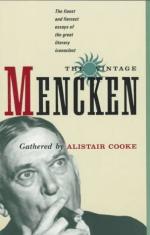
|
| Name: _________________________ | Period: ___________________ |
This test consists of 15 multiple choice questions and 5 short answer questions.
Multiple Choice Questions
1. What was the "last straw" that forced Mencken to quit the organization in #16?
(a) The fact that the running track was rectangular.
(b) A painful accident with the horizontal bar.
(c) An evangelical teen in the reading room.
(d) The relentless shouting of his gym teacher.
2. What was the subject of the first Mencken-written article that was ever published?
(a) A high-society party.
(b) Political discontent in Europe.
(c) The gold standard.
(d) A horse robbery.
3. What did Mencken wonder about Henry Cabot Lodge?
(a) Why he thought he was so superior to everyone.
(b) Why he did not run for president.
(c) Why he felt he must belittle everyone around him.
(d) Why he did not pick a more noble profession.
4. Which was NOT one of the reasons why a Christian wouldn't man cheat on his wife, according to "The Libertine"?
(a) He was too fatigued by all the Christian rules he must follow.
(b) He didn't have the money to support a mistress.
(c) He had a conscience to tell him no.
(d) He didn't have the courage.
5. What did Mencken satirize in "Quid Est Veritas"?
(a) Organized religion.
(b) Those who insisted Latin was not a dead language.
(c) Aristocrats.
(d) Country doctors.
6. In what way did Mencken mock General John Pershing?
(a) Mencken mocked Pershing for a recent bumbling speech.
(b) Mencken made fun of a recent photograph of Pershing wrapped in an American flag.
(c) Mencken felt the vast amount of medals pinned to Pershing's uniform makes the man look ridiculous.
(d) Mencken brought to light the existence of Pershing's mistress.
7. What criticism did Mencken have for the effect of the Emancipation Proclamation?
(a) It directly led to the Battle of Shiloh.
(b) It freed all slaves, when to preserve peace it should have freed only some.
(c) It freed slaves all at once, when it should have done it in a gradual way.
(d) It only freed specific slaves, and not all slaves.
8. According to Mencken, what kind of books did Theodore Dreiser produce?
(a) Wheezing, moralizing diatribes.
(b) Books more important as museum pieces than texts that should be read.
(c) Weighty, substantial tomes that one must concentrate on for a long time.
(d) Breezy, summer-day reading.
9. What famous speech did Ralph Waldo Emerson deliver in 1837?
(a) The Merits of Monogamy.
(b) The Pride of European Intellectualism.
(c) The Awfulness of War.
(d) The American Scholar.
10. Why did Mencken disagree with contemporary assessments of Abraham Lincoln?
(a) Mencken believed a much broader conspiracy was in place in regards to Lincoln's assassination.
(b) Critics maligned Lincoln for his handling of the Civil War, and Mencken thinks he did a fine job.
(c) Abraham Lincoln did not get nearly enough credit for freeing the slaves, according to Mencken.
(d) Critics praised him as a hero and don't question some dubious sections of his biography.
11. Who was the president of Cuba when Mencken visited the country in "Gore in the Caribees"?
(a) Jose Miguel.
(b) Teodorio.
(c) Menocal.
(d) Leonhard.
12. Which was NOT a source of terrible smell in the Baltimore of the 1880s, according to Mencken?
(a) The glue factory.
(b) The St. Helen's insane asylum.
(c) Wilkins Hair Factory.
(d) The Back Basin.
13. What dominated Puritanism, according to Mencken in "The National Letters"?
(a) Fear, and the suspicion of art.
(b) Religious tomfoolery.
(c) Free-thinking men of purpose.
(d) The simple necessities of food, clothing, and shelter.
14. Mencken provided what colorful phrase to describe a woman's body?
(a) A star-spangled mess.
(b) An hourglass of horrors.
(c) A drunken dollar-mark.
(d) A slap-happy seal.
15. Which book was Mencken's touchstone into literature?
(a) Thomas Paine's Common Sense.
(b) Alexander Dumas' The Three Musketeers.
(c) Mark Twain's Huckleberry Finn.
(d) Mary Shelley's Frankenstein.
Short Answer Questions
1. Why shouldn't men trust other men?
2. In "The Baltimore of the Eighties," why does Mencken's mother lament about a trip to the market?
3. Charlie the policeman was charged with which task, in "Recollections of Notable Cops"?
4. Which is one of the stated reasons the editor put the volume together?
5. In "Star-Spangled Man," Mencken argued that who, besides soldiers, should get medals?
|
This section contains 755 words (approx. 3 pages at 300 words per page) |

|




